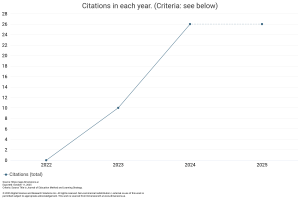Application of Literacy and Numeracy in Junior High School Learning
DOI:
https://doi.org/10.59653/jemls.v2i02.812Keywords:
Literacy, Numeracy, Teaching Campus, Junior High SchoolAbstract
The Numeration Literacy Program organized by the Ministry of Education and Culture and Technology in the Teaching Campus Program is a program that aims to improve the quality of education. The focus of this research examines the implementation of efforts to improve numeracy literacy skills through the 6th generation teaching campus program. This research method is a quantitative approach. The location of the study was carried out at State Junior High School 3 Tenggarong Seberang, the study population included students and teachers. Data collection using observation techniques, interviews, documentation, as well as AKM pre-test and post-test. The results showed that the implementation of the campus teaching program batch 6 through collaborative activities in the numeracy literacy application program carried out, including school making, reading movement 15 minutes before learning, language month activities, literacy teaching in class, numeracy ice breaking, numeracy snakes and ladders, Literacy Numeracy quizzes and the application of technology adaptation. The results of the implementation of the program can increase students' AKM scores on literacy by 8% and numeracy by 3%. This study concluded that the implementation of the numeracy literacy program through the 6th generation teaching campus can improve numeracy literacy skills.
Downloads
References
Adellia, R., &; Himawati, I. P. (2021). Actualization of Student Roles through Campus Teaching Activities at SD Muhammadiyah Lahat. In SNPKM: National Seminar on Community Service, 3, 142-150.
Ali, Z. (2022). Campus Teaching Program in Improving Literacy and Numeracy Skills of Elementary School Students (Case Study: SDN 17 Palu): Results of PENGABMAS. Journal of Community Service and Educational Research, 1(2), 77-84.
Dash, S., & Bhoi, C. (2024). Exploring the Intersection of Education and Artificial Intelligence: A Comprehensive Review. International Journal of Multidisciplinary Approach Research and Science, 2(02), 601–610. https://doi.org/10.59653/ijmars.v2i02.637
Fisabillillah, Y., &; Rahmadanik, D. (2022). Implementation of the application of literacy and numeracy in the implementation of the 3rd batch teaching campus at SDN 1 Kedungkumpul, Sukorame, Lamongan Regency. Community Development Journal: Journal of Community Service, 3(2), 876-883.
Lestari, S., Fatonahr, K., Halim, A., Aurra, L. M., & Rahmawati, S. (2022). Initiatives and Challenges of The Kampus Mengajar Program to Pursue Freedom to Learn. Pedagonal: Jurnal Ilmiah Pendidikan, 6(2), 203-210.
Lisnawati, I. I., Julia, J., &; Iswara, P. D. (2022). Implementation of Campus Students Teaching 2 in improving literacy skills in elementary schools. Primary: Journal of Primary School Teacher Education, 11(5), 1555.
Maharani, T. I., Supriadi, S., & Nurdiansyah, E. (2024). Analisis Peran Mahasiswa Kampus Mengajar 4 di SD Inpres Layang Tua II Kecamatan Bontoala. Jurnal Mirai Management, 9(1), 301–307.
Meke, K. D. P., Astro, R. B., Bagenda, C., Sulaiman, S., Seda, P., &; Djou, A. M. G. (2022). Student perceptions of the implementation design of independent learning independent campus: A survey of the law study program at the University of Flores. Educational: Journal of Educational Sciences, 4(1), 934-943.
Noorhapizah, N., Prihandoko, Y., Pratiwi, D. A., & Saputra, M. D. (2023). Effectiveness of the ‘BANGKIT’ Program to Support the Implementation of ‘Merdeka’ Curriculum in Primary Schools in a Wetland Environment. Journal of Education Method and Learning Strategy, 2(01), 8–16. https://doi.org/10.59653/jemls.v2i01.302
Palangda, L., Naharia, O., Sumual, S. D. M., Ebe, L. S., & Mandey, L. (2023). Analysis of Barriers to Implementation of the Independent Curriculum Study the Merdeka Campus in the Department Economic Education Manado State University. International Journal of Multidisciplinary Approach Research and Science, 1(02), 125–132. https://doi.org/10.59653/ijmars.v1i02.64
Sholehah, I. Teaching Campus Program: Efforts to Equalize Education in the 3T Region during the Covid-19 Pandemic. Jurnal Paradigma: Multidisciplinary Journal of Indonesian Graduate Students, 3(1).
Suputra, I. N., Basuki, A., Dharma, B. A., & Sakdiyyah, D. A. (2023). Implementation of Office Administration Practice Media to Welcome the Independent Curriculum. Journal of Education Method and Learning Strategy, 1(03), 114–125. https://doi.org/10.59653/jemls.v1i03.166
Suwanti, V., Suastika, I. K., Ferdiani, R. D., Harianto, W., &; Ketut Suastika, I. (2022). Analysis of the impact of the implementation of the teaching campus program on student perceptions. JOURNAL of PAJAR (Education and Teaching), 6(3), 814-822.
Waldi, A., Putri, N. M., Indra, I., Ridalfich, V., Mulyani, D., &; Mardianti, E. (2022). The Role of Teaching Campus in Improving Literacy, Numeracy, and Technology Adaptation of Elementary School Students in West Sumatra. Journal of Civic Education, 5(3), 284-292.
Wisdayanti, W., Hasan, H., & Nadjamuddin, L. (2023). Impact of Multicultural Based Education Learning In the Process of Social Integration at SMA Al Azhar Mandiri Palu. Journal of Education Method and Learning Strategy, 2(01), 44–53. https://doi.org/10.59653/jemls.v2i01.311
Downloads
Published
How to Cite
Issue
Section
License
Copyright (c) 2024 Gyta Krisdiana Cahyaningrum, Didik Cahyono

This work is licensed under a Creative Commons Attribution-ShareAlike 4.0 International License.
Authors who publish with this journal agree to the following terms:
- Authors retain copyright and grant the journal right of first publication with the work simultaneously licensed under a Creative Commons Attribution-ShareAlike that allows others to share the work with an acknowledgement of the work's authorship and initial publication in this journal.
- Authors are able to enter into separate, additional contractual arrangements for the non-exclusive distribution of the journal's published version of the work (e.g., post it to an institutional repository or publish it in a book), with an acknowledgement of its initial publication in this journal.
- Authors are permitted and encouraged to post their work online (e.g., in institutional repositories or on their website) prior to and during the submission process, as it can lead to productive exchanges, as well as earlier and greater citation of published work (See The Effect of Open Access).
























